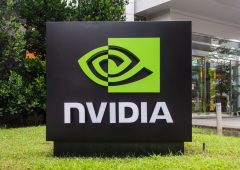Can Nvidia Maintain Its Dominance Amid Trade War Fears and AI Demand Surge?
18.11.2024 21:00 1 min. read Alexander Stefanov
Nvidia's dominance in the tech sector is undeniable, with its stock surging thanks to the booming AI industry.
The company’s chips have become essential to the infrastructure powering everything from cloud data centers to consumer tech. Its leadership in AI chip production positions it at the forefront of the tech revolution, with analysts forecasting continued growth.
The surge in demand for Nvidia’s products, particularly its Blackwell chips, is a direct response to the rapid advancements in AI, which is expected to continue expanding, potentially outpacing supply for the foreseeable future.
However, the global trade environment presents a growing risk. While Nvidia has managed to navigate challenges, including a decline in its China revenue, new tariffs, especially under a potential second Trump administration, could disrupt the company’s supply chains. The impact of these tariffs might not be immediate but could still create ripples across the global tech sector.
On the other hand, Nvidia’s significant presence in the U.S. and continued high demand for its products could help mitigate some of the negative effects.
Investors are waiting to see if Nvidia can keep up its momentum, especially as it prepares for new product releases in the coming months. As the situation unfolds, Nvidia’s ability to balance rapid growth with external pressures will be key to its long-term success.
-
1
Federal Reserve Chair Jerome Powell Reportedly Weighing Resignation
12.07.2025 21:00 2 min. read -
2
Vitalik Buterin Warns Digital ID Projects Could End Pseudonymity
29.06.2025 9:00 2 min. read -
3
Donald Trump Signs “One Big Beautiful Bill”: How It Can Reshape the Crypto Market
05.07.2025 9:56 2 min. read -
4
Toncoin Launches UAE Golden Visa Program Through $100,000 Staking Offer
06.07.2025 12:04 2 min. read -
5
What’s Driving July’s Crypto Conversations, According to Santiment
05.07.2025 22:00 2 min. read
Stablecoins Now Used in Credit Cards, Putting Bank Deposits at Risk
Stablecoins are no longer just a crypto-native tool—they’re reshaping financial access, payments, and even central banking dynamics.
BitGo Files Confidentially for IPO With SEC
BitGo Holdings, Inc. has taken a key step toward becoming a publicly traded company by confidentially submitting a draft registration statement on Form S-1 to the U.S. Securities and Exchange Commission (SEC).
Crypto Greed Index Stays Elevated for 9 Days — What it Signals Next?
The crypto market continues to flash bullish signals, with the CMC Fear & Greed Index holding at 67 despite a minor pullback from yesterday.
U.S. Public Pension Giant Boosts Palantir and Strategy Holdings in Q2
According to a report by Barron’s, the Ohio Public Employees Retirement System (OPERS) made notable adjustments to its portfolio in Q2 2025, significantly increasing exposure to Palantir and Strategy while cutting back on Lyft.
-
1
Federal Reserve Chair Jerome Powell Reportedly Weighing Resignation
12.07.2025 21:00 2 min. read -
2
Vitalik Buterin Warns Digital ID Projects Could End Pseudonymity
29.06.2025 9:00 2 min. read -
3
Donald Trump Signs “One Big Beautiful Bill”: How It Can Reshape the Crypto Market
05.07.2025 9:56 2 min. read -
4
Toncoin Launches UAE Golden Visa Program Through $100,000 Staking Offer
06.07.2025 12:04 2 min. read -
5
What’s Driving July’s Crypto Conversations, According to Santiment
05.07.2025 22:00 2 min. read


